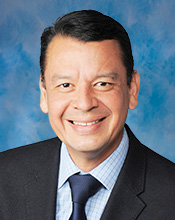Signs of Early Puberty
March 20, 2023

Revised: August 13, 2024
Naturally, as parents, we marvel at how our precious children grow and change at every stage of life — from newborn to adulthood. But what if certain physical changes are happening too soon? Maybe your little girl’s breasts are developing sooner than you expected. Or, maybe your young son is already growing body hair.
“Sometimes, children experience an early onset of puberty, or what we call precocious puberty,” explains Mauricio Flores, MD, a pediatric endocrinologist with Joe DiMaggio Children’s Hospital.
Endocrinologists specialize in treating issues related to the hormones and glands. “Precocious puberty is the normal progression of puberty happening too early — before age 8 in girls and before age 9 in boys,” says Dr. Flores. “However, precocious puberty is not normal, and we need to take steps to determine why it’s happening.”
What is puberty? And what age is “normal” for my child to show signs of puberty?
Puberty is the time in a child’s life when hormone levels increase and signal the body to mature sexually.
Typically, girls start showing signs of puberty between ages 8 and 13, with the average at age 10. The first signs of puberty in girls are usually:
- Breast buds
- Pubic or body hair
- Body odor
- Acne
Within the next two years, typically around age 12 or 13, girls start their menstrual periods.
Boys normally show the first signs of puberty a little later than girls — between ages 9 and 14, with the average at age 12. Typical signs of puberty in boys include:
- Growth of penis and testicles
- Pubic, facial or body hair
- Body odor
- Acne
Don’t be surprised if your boys and girls are moody and irritable during puberty too. They may also experience a growth spurt and stand taller than others who have not yet started puberty.
Why do some children start puberty earlier than others?
In most cases, experts cannot pinpoint a specific cause of precocious puberty. Sometimes, a child starts puberty early because genetic disorders trigger the early release of hormones.
Other times, medical issues trigger precocious puberty, including:
- Tumors or growths in the brain
- Brain injuries that affect hormonal balances (from surgery or a blow to the head)
- Cerebral palsy
- Inflammation of the brain, sometimes due to an infection
- Tumors or abnormalities in the ovaries, testicles, adrenal glands or thyroid gland
- Exposure to medicines or creams that contain hormones
How common is the early onset of puberty?
Precocious puberty is considered rare. According to the National Institutes of Health (NIH), one out of every 5,000 to 10,000 children experiences precocious puberty. Girls are ten times more likely to have precocious puberty than boys. Also, on average, African American and Hispanic girls tend to experience signs of puberty earlier than white girls. Obesity in early childhood may be a risk factor for precocious puberty, particularly in girls.
When should I contact a pediatrician about early puberty?
Early treatment is important to rule out serious medical conditions — or treat them.
“Consult a pediatrician if your daughter shows signs of puberty before age 8 or if your son starts puberty before age 9,” says Dr. Flores. “Although rare, sometimes early puberty indicates the child has an underlying medical condition. We will make a diagnosis and treat your child’s condition. Then, if needed, we can use medicine to stop the progression of puberty until the time is right.”
Your pediatrician may:
- Review your child’s medical history
- Conduct physical scans
- Run blood tests to check hormone levels
- Order X-rays to check the impact of hormones on your child’s bone growth
Your primary care provider may also refer you to a pediatric endocrinologist for specialized care.
How does precocious puberty impact my child physically and socially?
When children start puberty early, they look older and more physically developed than other children their age. They may feel awkward or “different” from others. Also, because they look physically mature, people may expect them to act older.
“Early puberty leads to early mood swings and early stress. Children with precocious puberty are not emotionally ready to engage in certain conversations and interactions that older girls and boys have during puberty,” says Dr. Flores. “Also, they can be a target of sexual harassment or abuse by older kids.”
Early puberty can impact your child’s ultimate height too. Although children with precocious puberty mature faster than their peers, they often stop growing sooner than they should. As adults, they tend to be shorter than average. Early treatment can help children grow taller.
How can I help my child cope with precocious puberty?
It’s very important to talk with children about the changes their bodies experience during puberty — and how you and your doctors can help. If you are not comfortable talking with your child about these topics, ask your pediatrician and specialists for help.
Learn about Joe DiMaggio Children’s Hospital's pediatric endocrinology and adolescent medicine services to find a specialists who can answer your questions about whether or not your child might be starting puberty early and offer important care and treatment.

